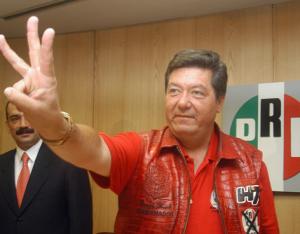There are times in which the enforcement of the law may represent a step backward for the rule of law.
Jorge Hank Rhon, a powerful figure in Mexico’s once-dominant Institutional Revolutionary Party (PRI), was arrested before dawn last Saturday for the possession of a sizable illegal arsenal in his home. Some 50 members of an elite military unit, acting on an “anonymous complaint,” raided his Tijuana home at four in the morning and reportedly found 40 large-caliber arms, 48 small arms, over 9,000 cartridges, 70 ammunition clips, and a gas grenade.
Discovering arms caches in Mexico is far from an unusual occurrence but since Hank is a well-known, well-connected, flamboyant public figure in the still-powerful PRI, his arrest turns out to have political implications. And beyond implications, many are now saying that the arrest had political purposes.
 Hank Rhon is a former mayor of Tijuana, a former PRI candidate for governor of Baja California, and scion of one of the past century’s most influential families in Mexican politics. He is the wealthy owner of dozens of hotels, shopping malls, clubs and casinos. He is not a citizen above suspicion. One of his bodyguards is currently serving time for the murder of a prominent investigative journalist who was reporting on his affairs. He was once imprisoned for attempting to import exotic animals—animals on the endangered-species list—into Mexico.
Hank Rhon is a former mayor of Tijuana, a former PRI candidate for governor of Baja California, and scion of one of the past century’s most influential families in Mexican politics. He is the wealthy owner of dozens of hotels, shopping malls, clubs and casinos. He is not a citizen above suspicion. One of his bodyguards is currently serving time for the murder of a prominent investigative journalist who was reporting on his affairs. He was once imprisoned for attempting to import exotic animals—animals on the endangered-species list—into Mexico.
While sympathies for Hank Rhon are not high, the timing and circumstances of his arrest are suspicious. Residents of Tijuana have known for years he was frequently armed, that he had many armed bodyguards, and that no “anonymous tip” was necessary to bring those facts to the attention to the federal armed forces. So, why is his house being searched now, when he could have been arrested ten years ago on the same charges?
The ruling National Action Party (PAN), the conservative party of President Felipe Calderón, finds itself in a weakened condition as it enters a political season that will culminate in presidential elections next summer. In early presidential polling, about 30% of potential voters say that if the election were held now they would vote for the PRI governor of the State of Mexico, Enrique Peña Nieto. Andrés Manual López Obrador of the left-of-center Party of the Democratic Revolution (PRD) is a distant second with about 10% of the preferences, and no other potential candidate—of any party—registers above 3%. True, it’s very early, and no one has officially announced his or her candidacy, but the PAN is worried.
Hank Rhon’s arrest—and the “discovery” of the private arsenal—comes a month before a crucial three-way gubernatorial election in the populous State of Mexico. The state’s outgoing governor, Peña Nieto, comes from the same political group within the PRI as does Hank Rhon, and is considered certain to gain the PRI’s presidential nomination. Peña Nieto’s handpicked candidate to replace him as governor, Eruviel Ávila, also has a wide lead over the PAN candidate Luis Felipe Bravo Mena and the PRD candidate, Alejandro Encinas.
Many analysts, even some dissident PANistas like former party president Manuel Espino, thus believe that the arrest was timed to weaken Ávila’s candidacy next month, and Peña Nieto’s next year. The PAN, since it gained federal power in 2000, has done this before, having attempted to disqualify López Obrador’s presidential candidacy in 2006 with minor charges that were eventually thrown out of court, and three years later in the state of Michoacán with what has become known as the michoacanazo, in which dozens of mayors and political functionaries, mostly affiliated with the PRD, were arrested on federal drug trafficking charges, only, with one exception, to be eventually released for lack of evidence.
Back to Jorge Hank Rhon: After the first day of reporting, the discussion here in Mexico, in the media and on the street, has been about the political implications of Hank Rhon’s arrest, and not about the size of the arms cache or his reported failure to get a permit for his arsenal. The lesson here is that when arrests are made for political purposes, people become more concerned with those purposes than with the alleged crime itself. This diminishes the perceived magnitude of the crime, no matter how great it may actually be. It also contributes to the public perception that justice is arbitrary, thus reinforcing the already high level of impunity in Mexico’s system of criminal justice.

